Niayesh Sadrzadeh
Content Marketing Manager
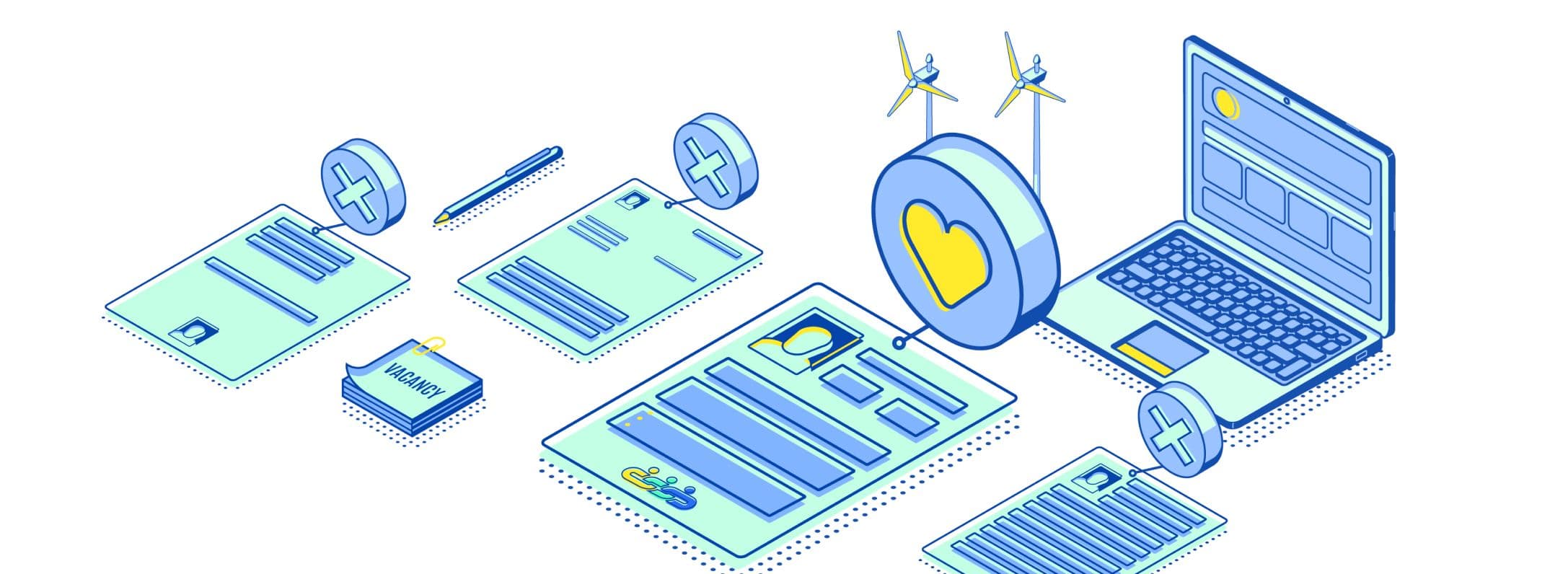
Why the Offshore Industry Needs Uniformity?
What do you call yourselves? And how do employers search for you? Chief Officer, Chief Mate, Ordinary Seaman, or OS? Second Engineer, 2nd Engineer, 2nd Mate, or Second Mate? Etcetera. This is only one example of the lacking uniformity in the maritime and offshore industry. Non-uniformity hinders the application procedures, hence reducing your opportunities in the offshore market. This article explains why, and how Crewlinker ensures the required uniformity.
What is uniformity?
Before we dig into its importance, what exactly is uniformity? It's a condition wherein things are uniform, i.e. similar and consistent. Take the costumes of captains. Captains all wear a cap and have four stripes on their shoulders. This uniformity makes them distinguishable from other crew members and recognizable as captains. Another example is that all mates know how to navigate a ship. This ensures safety on board.
The opposite of uniformity is a state of variation, whereby things are different from each other. If captains were allowed to decide themselves what to wear, would you know who the captain is? And if mates all receive different training, how could operators count on them? You can imagine that this would lead to undesirable situations of uncertainty and chaos on board.
These examples give a good idea of the meaning and importance of uniformity. In this way, we can understand the uniformity that is missing in the maritime and offshore sectors. While there is general consistency in clothing and operations on board, the maritime and offshore industry does lack uniformity in its communication and search methods. That hinders the application procedures and in turn your sea job opportunities.
Non-uniformity in communication
1. Terminology
To begin with, seafarers, operators, and crewing agencies communicate through a specific terminology, meaning 'language' or vocabulary. The introduction of this article shows its non-uniformity in practice - the same job titles are described differently by seafarers and employers, using different words or abbreviations. The same goes for the divergent descriptions made of sea services.
Operators and crewing agencies are searching for you on the internet or in their own lists of seafarers. They apply terminology from the shipping industry. And guess what? Do they all use the same keywords as other employers? And even more important, the same as yours? They don't. On top of that, spelling mistakes can happen. This can cause undesirable situations that have negative influences on your sea job opportunities.
First, operators and crewing agencies can have incomplete search results. There is a good chance that you are not among the possible candidates. This while you have the same profile as the seafarers who are presented as suitable for the sea job. You and potential employers simply miss each other because you both use different terms for your job title or shifts worked. Or your spelling wasn't correct.
“Seafarers and employers miss each other because of the different use of terms”
Second, operators and crewing agencies can have incorrect search results - people are presented as suitable for the sea job while they are not. In the worst case, for example, it concerns a person who turns out not to be a seafarer at all. He calls himself a second engineer, but he works in a completely different industry. That means the lost time that employers could have put into you.
Or, maybe you wrongly appear in their search results. Hence, you receive job offers below your level or outside your specialty. The other way around can happen too. May be the wrong or just a few operators and offshore vacancies appear in your search results. Also, here because of the different use of keywords between you and potential employers.
Hence, you run the risk that you miss or don't find a (suitable) sea job opportunity (or internship for nautical students). You will unfairly not be seen or chosen. Of course, nuances can be made. Operators and crewing agencies take the multiple existing terms into account. However, there is no clear standard in terminology use. How can you expect then which words you should employ?
Crewlinker: the same use of terminology
The answer to that question is 'Crewlinker'. We offer a standard in terminology, allowing you seafarers as well as operators and crewing agencies to search each other in the most efficient way. Your search results and that of employers will be complete and correct. In this way, the chances to find (suitable) sea jobs are in terms of word usage equalized.
Concerning filling in your sea services in your Crewlinker profile, we propose all possible duties. Don't worry about which version you should use. Just pick your job title from the list. The same goes for vessel types. In another article, you can read how the vessel names, operators, and even vessel types are filled in automatically. Further, we explain how to best name the 'additional project tags'.
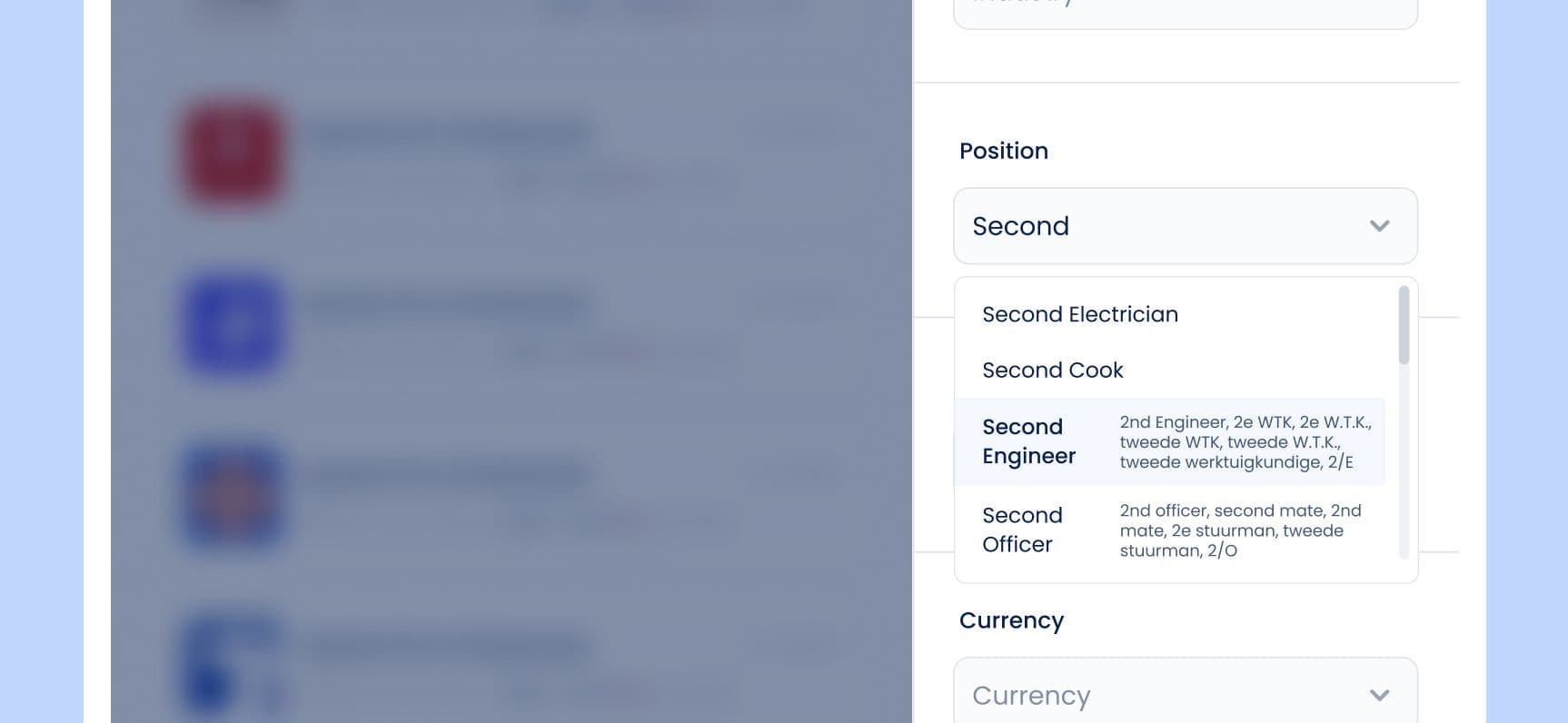
The names of certificates and education are also set up in a list. With the preselected and automatically filled-in terms, we prevent spelling mistakes and therefore errors in the filter process. The filter options with which operators and crewing agencies will search for you on Crewlinker are based on the standardized terminology from your profile. This is how we make sure you both use the same vocabulary.
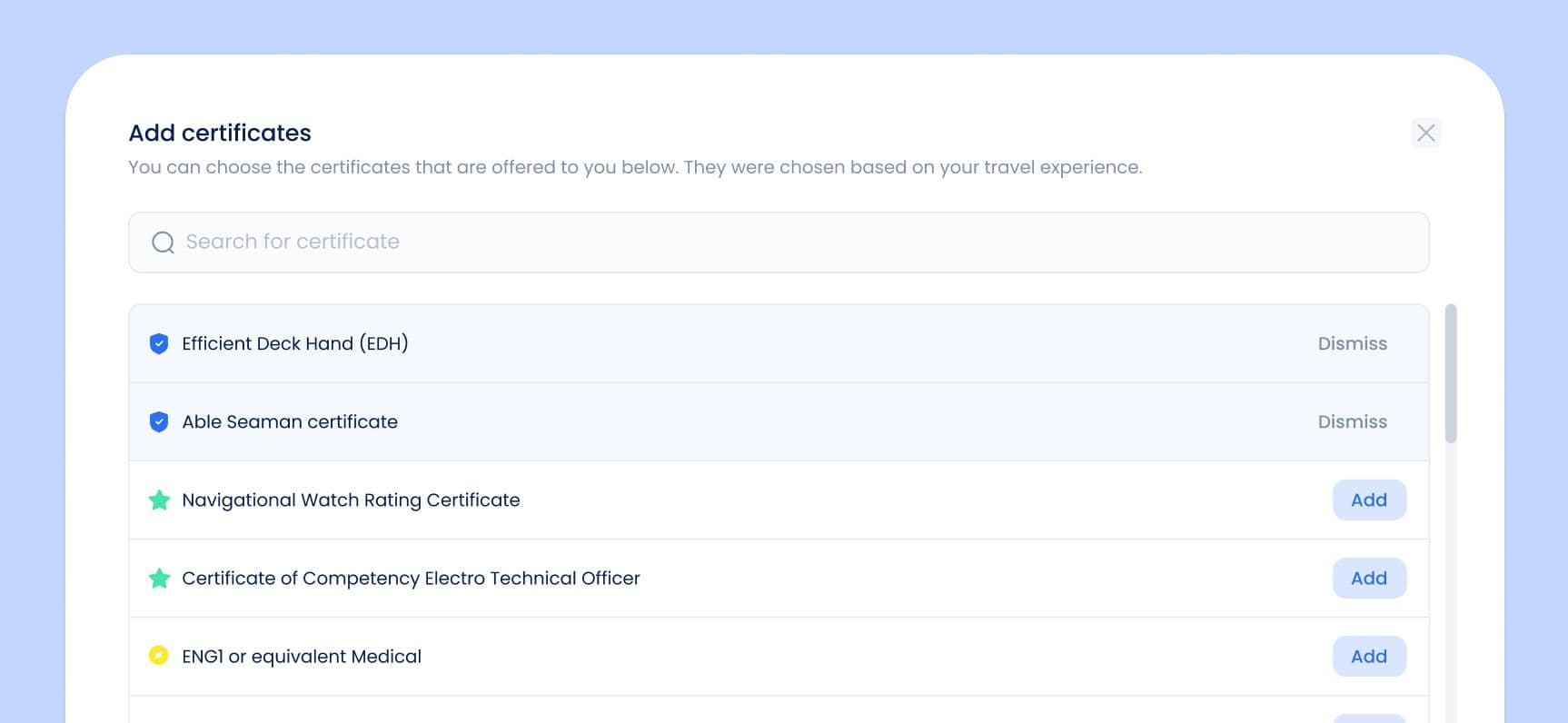
2. Information
The second communicative element that lacks uniformity is information. On the one hand, it has to do with details of your sea services, certificates, the operators you work(ed) for, and your appraisals. On the other hand, it concerns details of maritime companies, vacancies, and contracts. Also here, your chances in the maritime and offshore industry are decreased.
For seafarers, the guidelines on what information you need to mention in your CV are not always clear enough. Therefore, you may not be sure what and how many details operators and crewing agencies want to know. Or you may use the wrong terminology or make spelling mistakes. Your CV could be incomplete, incorrect or too dense. In that case, the chance is small that employers go through your profile.
“Operators and crewing agencies don't go through an incomplete, incorrect or too dense CV”
On the employer side, information provision could be scarce as well. A seafarer describes: "I was asked for a position as a helmsman. Then it turned out that 'sailor' was mentioned in my contract." Another seafarer tells: "I was told that I was suitable for the job. It turned out that I was missing a certificate." Employers should communicate this kind of information, before promising the sea job.
Fraudulent practices can happen as well. "The company I applied to turned out to be fake. But I had already sent all my documents. Maybe they want to sell my visa", tells an experienced seafarer. Fraud is also committed by seafarers. "Sometimes a seafarer turns out to have a fake certificate or has cheated with the expiration date", explains Tanguy Wagenaar, consultant at crewing agency TOS Netherlands.
Crewlinker: the right information provision
Crewlinker optimizes the information provision from both sides. As for seafarers, with easy-to-follow steps, document-management, and preselected and automatically filled in - thus well spelled and correct - vessel details, we help completing your profile with the right information. You can read more about this in our article 'Less is more'.
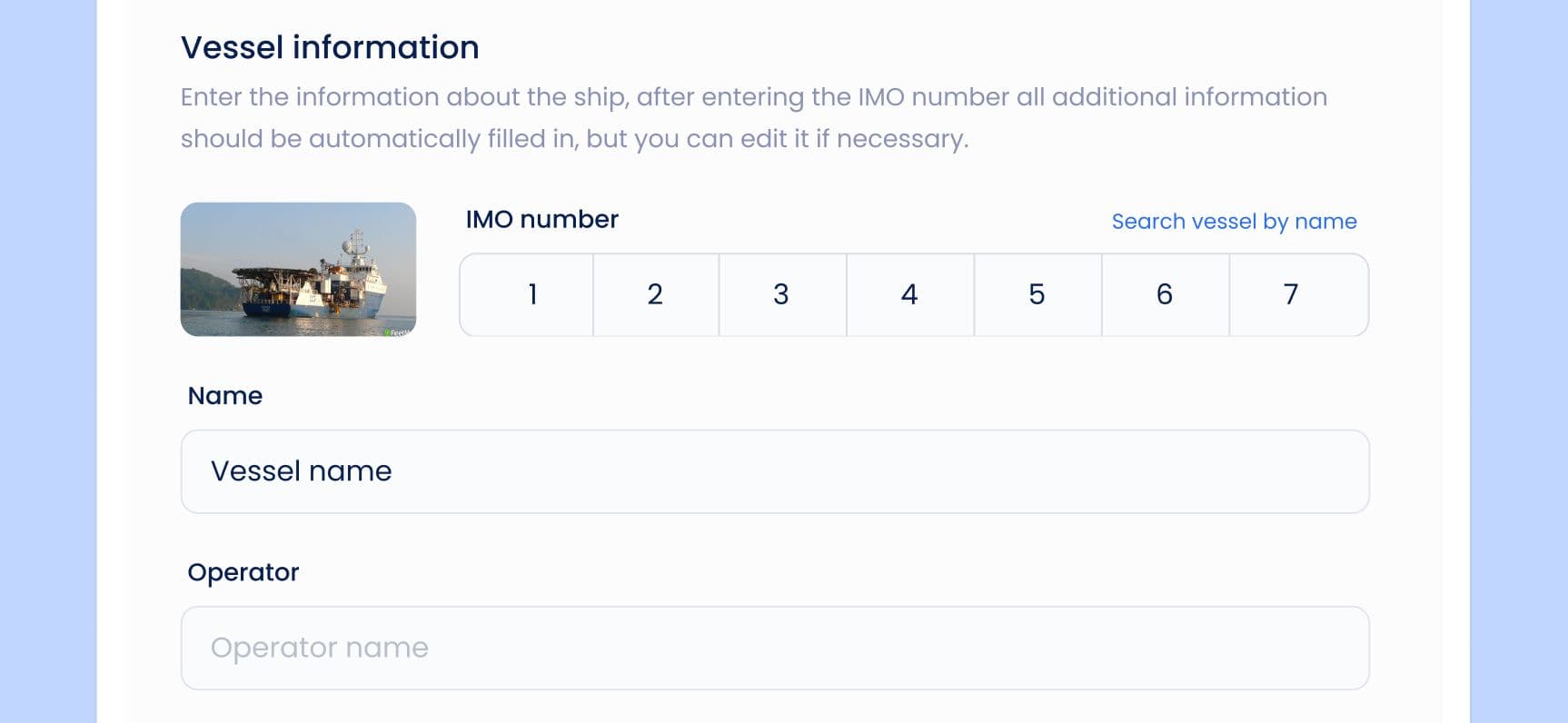
As explained in the terminology chapter, the employer's search filters are based on the information you enter yourself or are entered by us in your profile. For every seafarer, the same type of details are presented, correctly and completely. That makes it easier for employers to find corresponding seafarers. There is a good chance that you will end up with the right operator or crewing agency.
3. Layout
The third communicative element that lacks uniformity is the layout of your resumes. Most of you probably use a software program on the computer to create a resume. Or some companies offer the possibility to create one on their website. You and especially operators and crewing agencies have noticed that these CV's all look different. And that one CV is better than the other.
The difference of your resume with those of other seafarers form a barrier to your sea job chances. Employers don't have the time and energy to search for relevant information each time in a slightly different way. While you could differentiate yourself from your peers by a better layout, you're more likely to be overlooked or to be put away by employers. Therefore, the same layout for everyone works better.
“The right layout is what makes employers decide to go through your CV, rather than to put it away”
Looking only at your own CV, are you satisfied with your layout? Maybe you don't consider your resume as structured or organized as you'd like it to be. How do you make sure then that your document looks sharp, arranged and therefore uniform? That is difficult. And even if you are quite satisfied with the layout, employers may think differently.
The readability of your CV is extremely important - your information should be well-organized and correctly spelled, and the most important details should stand out. In this way, employers can see immediately what you have to offer them. Your layout determines your first impression. And the right first impression is what makes employers decide to go through your resume, rather than putting it away.
Crewlinker: the same tight layout
For that reason, our team designed a profile format that looks the same, call it uniform, for every seafarer. In this way, the filtering process is much clearer for operators and crewing agencies. For them, finding a suitable seafarer goes faster and easier. Chances are higher that you will be found by a suitable employer.
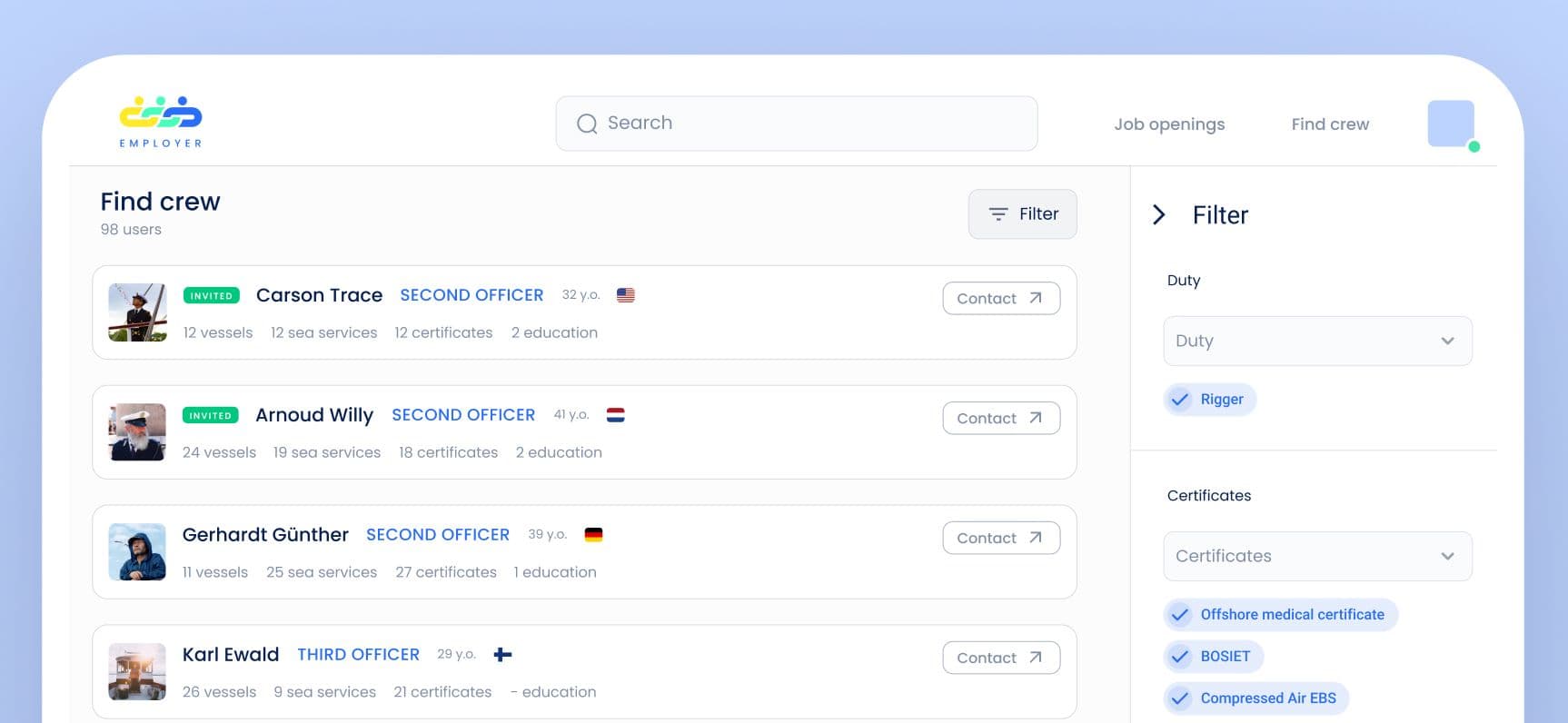
Non-uniformity in search method
4. (Searching in) databases
The fourth element that is lacking uniformity concerns the search methods that are used by seafarers as well as by operators and crewing agencies. The problem here is that one big database is lacking where operators and crewing agencies can find seafarers and vice versa. Also, the ability to search in such database isn't optimal as the data is not always 'clean' and the algorithms aren't perfect.
A database in this context means a gathering of the information (data) from multiple resumes (and details from operators and crewing agencies). This data is 'clean' when it is consistent, accurate and complete in its information provision, terminology and layout. If not, 'dirty' or, as explained earlier, incorrect and incomplete search results occur.
“You will be overlooked as you are not in a certain database, you fall outside the search results, or you disappear in email boxes”
There are existing platforms, 'databases', where employers and seafarers can search for each other. However, they may be not specific for the maritime and offshore industry. There is no standard in the use of terminology and the format to present information about your career is not satisfactory. Because of the resulting 'dirty' data, it's harder for employers to find you. And it is more difficult for you to find a (suitable) job.
Most employers search in their own database - over time they created their own pool of seafarers. Also, they receive daily dozens of CVs by email. How are these filterable? The unstandardized terminology and different (may incomplete or incorrect) resumes don't make it easier. You will be overlooked as you are not in a certain database, you fall outside the search results, or you disappear in their email box.
Crewlinker: a 'clean' database
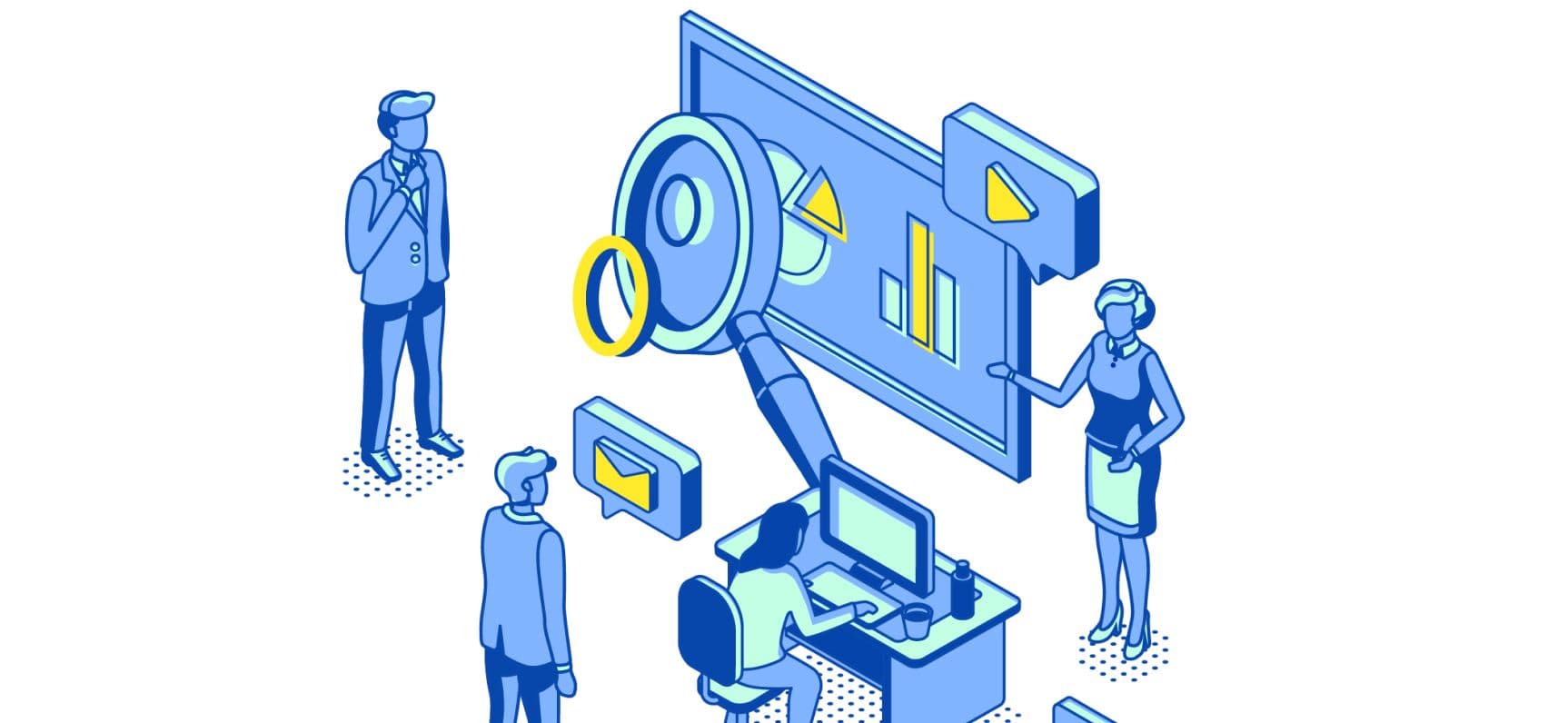
We make sure that this will not happen anymore. Crewlinker is developing as a 'clean' database. You can call us a database as we are a meeting place for seafarers, operators and crewing agencies from the maritime and offshore industry. We give the possibility to bring them all together, instead of leaving employers with their differentiated databases of seafarers.
Crewlinkers ensures the so-called 'clean' data by providing the right information provision and layout as well as a standard in terminology and in the format of a Crewlinker profile. "It will be easier for operators and crewing agencies to find us, as Crewlinker ensures uniformity in the terms of the different job categories", says Jasper Rengenhart, who is an experienced second engineer.
While 'clean' data should be the base for optimal search results, a well-thought-out algorithm is necessary as well. Therefore, we figure out the best recipes, or call it calculations, with the right combinations of data. In this way we can automatically and efficiently match you seafarers with (vacancies from) operators and crewing agencies.
In short
In short, the maritime and offshore industry lacks uniformity because of a missing standard in the use of terminology, the scarce information provision and the loose layouts of resumes. Because of the latter, a 'clean' comprehensive database is lacking in which seafarers and employers can search for and be matched with each other in an optimal manner.
This non-uniformity has serious consequences for your application procedures in finding a next (suitable) sea job. Operators and crewing agencies can’t always find the right crew. Simultaneously, seafarers and nautical students have trouble finding the right sea jobs and internships. Your opportunities in the maritime and offshore industries are reduced.
“The need for uniformity, hence the need to increase your sea job opportunities, is the reason why Crewlinker exists.”
As Crewlinker is invented by people who have years of experience in the maritime and offshore industry, we can observe the lack of uniformity and its negative consequences. The reason that Crewlinker exists is to bring uniformity to the industry, thereby increasing your chances as seafarers. We accomplish this by offering a standard in terminology, the right information provision, a tight layout, and by developing as a 'clean' database.
It is important to note that the possibility for seafarers as well as for operators and crewing agencies to search for and approach each other via Crewlinker is not live yet. We are continuously developing, to make this option available soon. We will keep you updated via the website and social media. If you have any further questions, don't hesitate to contact us via hello@crewlinker.com.